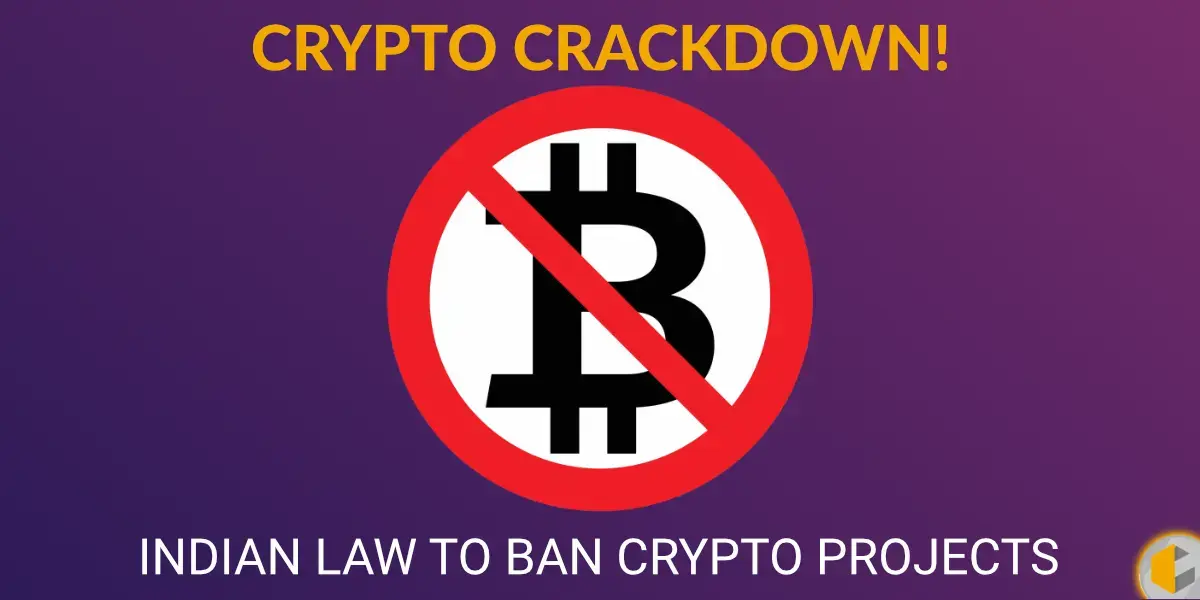
Blockchain projects are the core of cryptocurrency. Whether we are talking about Bitcoin, Litecoin, Etherium, or a nuch smaller project. It doesn’t matter. If there distributed ledger technology is banned, then cryptocurrencies can not operate. End of story.
India announced crackdown on Blockahin projects
So when India announced that they are going to completely ban blockchain projects everyone became a bit frustrated and cautious. After all, dealing with cryptocurrency is slowly becoming the everyday norm and such a ban could potentially affect thousands of people. Well, that’s not actually true. It would affect 5 million Indians who currently own cryptocurrencies. That’s a lot of people, especially considering the fact that some of these people use it to make a living. Then we are talking about entire families who are being cut off from their source of money.
But what does the government actually do to these people? And what conditions do they need to meet to actually commit a crime?
The Banning of Cryptocurrency and Regulation of Official Digital Currency Bill 2019 proposes a 10-year prison sentence for anyone who generates, mines, has, sells, sends, disposes of, issues or deals in cryptocurrencies. So basically, if you live in India and come into any contact with bitcoins, for example, then you could be facing quite a few years in jail. Thankfully this bill is only in its’ draft phase, so these kinds of laws aren’t active. Yet. The enforcement part hasn’t been thought of much. Cryptocurrencies are named exactly that for a very good reason. They are very hard to keep track of, especially when it comes to the location of users. It is possible though, so there is a small chance that the government decides to basically hunt down cryptocurrency users. Although, this would be very costly and not worth it.
Implementation of proposed laws
But don’t be too alarmed, India’s government is still very unsure about how they are trying to go about the matter. The wording in their original announcement is very informal, so we can’t make out much of it. Only one thing is sure: that they want to ban anything that has to do with blockchain projects. The emphasis is on want. This regulation would affect way too many people and it would be really hard to maintain a complete ban of cryptocurrencies. So in reality, this is very likely just a desperate attempt to scare people away from using them.
Unfortunately, though, such a law would significant negative impact people’s lives.
First of all, let’s look Zebi, one of the largest Blockchain projects to originate out of India. Their team are made up with alumni from Stanford, MIT, Oxford and IIT as well as other Silicon Valley industry veterans. These are all people who are suddenly at risk of losing their jobs and reliable income, because of this regulation. They could potentially earn themselves an even longer jail time if they don’t willingly cease their ambitious project, unless they move abroad. Rahul Jain from Bitbns talked about the matter with the Economic Times:
“As a startup from India, we always wanted to serve from India, but this recent complication has made it difficult for domestic crypto exchanges to operate their businesses in India. So, we are now an Estonia-based company, and any Indian law to criminalize crypto will not impact us.”
This statement led to a lot of citizens and companies wondering if they should just move abroad. It would make things simpler and they wouldn’t be at risk of going to jail for several years. With huge organisations, this usually isn’t a problem. The establishments and physical manifestations of the company are sold and moved abroad. But because their existence is only important online, this move doesn’t affect much. Only the employees who need to be present physically. Even then, companies would make sure that their workers are able to do their job properly, even if it means working from home.
How does this affect individuals?
This is where the matter gets more serious. If such a law is passed, then a lot of people who are earning an income with cryptocurrencies will leave the country. And those who used cryptocurrencies as a way to support themselves and the ones who want to be able to make a living off of them. This could impact the majority of the younger generation. By regulating cryptocurrencies, India could experience a decrease in population, as the youth move to . Since the Internet is the easiest way to earn money and it’s what the youth is good at handling, they will realise that this is not worth it for them. Think about it. These people, who are still almost children, will be forced to do the kind of work they aren’t good at. That they don’t like. All the while, their safe and easy way of online buying and selling is eliminated. Plus, there is a much easier way to earn money, one that they are better at and enjoy doing.
What if other countries start implementing such regulations too?
There is a very low chance that this will happen, thankfully. The reason for this is that other countries have managed to properly tax the income people produce from cryptocurrency. Which is the main problem in India. The only thing that the government is the most concerned about is the fact that people aren’t paying their fair share even though they are earning a steady income. A fair point, honestly. But because of this, the idea can’t really spread, because other countries don’t have a reason to stop such money flows.
So if you don’t need to be too worried that this regulation will spread to your country too. It is unlikely countries who presently tax cryptocurrecies will impose limits on open source technologies used.
Editor-in Chief
Related Posts






Subscribe to our newsletter!
Information




